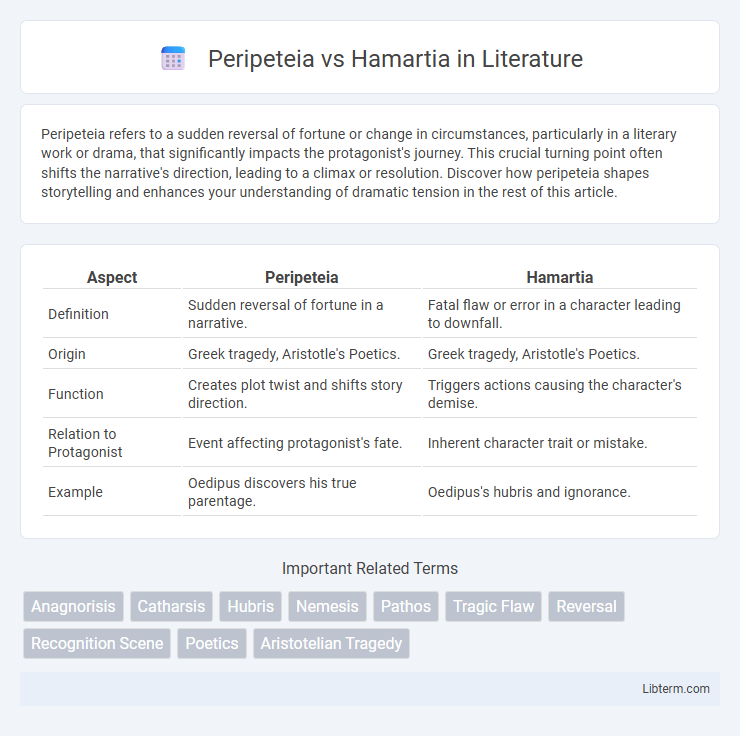Peripeteia refers to a sudden reversal of fortune or change in circumstances, particularly in a literary work or drama, that significantly impacts the protagonist's journey. This crucial turning point often shifts the narrative's direction, leading to a climax or resolution. Discover how peripeteia shapes storytelling and enhances your understanding of dramatic tension in the rest of this article.
Table of Comparison
| Aspect | Peripeteia | Hamartia |
|---|---|---|
| Definition | Sudden reversal of fortune in a narrative. | Fatal flaw or error in a character leading to downfall. |
| Origin | Greek tragedy, Aristotle's Poetics. | Greek tragedy, Aristotle's Poetics. |
| Function | Creates plot twist and shifts story direction. | Triggers actions causing the character's demise. |
| Relation to Protagonist | Event affecting protagonist's fate. | Inherent character trait or mistake. |
| Example | Oedipus discovers his true parentage. | Oedipus's hubris and ignorance. |
Understanding Peripeteia: Definition and Origins
Peripeteia, a crucial concept in classical tragedy, refers to a sudden reversal of fortune or change in circumstances that drastically alters the protagonist's situation. Rooted in Aristotle's Poetics, peripeteia originates from Greek tragedy and serves as a pivotal plot device that triggers dramatic tension and emotional impact. Understanding peripeteia involves recognizing its role in transforming the narrative trajectory, often leading to the protagonist's downfall or enlightenment.
Defining Hamartia: The Tragic Flaw Explained
Hamartia, often defined as the protagonist's tragic flaw, is a critical concept in classical tragedy that triggers the character's downfall. This inherent defect, whether it be excessive pride, impulsiveness, or moral blindness, disrupts judgment and leads to catastrophic consequences. Unlike peripeteia, which signifies a sudden reversal of fortune, hamartia represents the underlying weakness that precipitates this reversal, deeply intertwining character and fate in tragic narratives.
Historical Context: Peripeteia and Hamartia in Greek Tragedy
Peripeteia, a sudden reversal of fortune, and Hamartia, often defined as a tragic flaw or error in judgment, are central concepts in Greek tragedy, deeply rooted in the works of playwrights such as Sophocles and Aristotle's Poetics. Historically, Peripeteia represents a pivotal turning point in the narrative, shifting the protagonist's fate from good to bad, while Hamartia illuminates the protagonist's inherent imperfection or mistake that triggers this reversal. These elements illustrate the Greek tragic vision of human vulnerability and the inexorable interplay of fate and character in classical drama.
Key Differences Between Peripeteia and Hamartia
Peripeteia refers to a sudden reversal of fortune or change in circumstances within a narrative, often leading to the protagonist's downfall, while hamartia denotes a tragic flaw or error in judgment that causes the hero's downfall. Peripeteia is an event or turning point, whereas hamartia is a character trait or mistake that triggers the adverse outcome. Understanding these distinctions highlights how peripeteia drives the plot through external shifts, while hamartia roots the tragedy in internal character flaws.
How Peripeteia Drives Plot Reversals
Peripeteia acts as a crucial turning point in narratives, where a sudden reversal of fortune intensifies the plot and shifts the protagonist's trajectory from success to failure or vice versa. This plot device triggers unexpected developments that deepen the dramatic impact, often exposing underlying flaws or previously unseen challenges. Unlike hamartia, which represents a character's fatal flaw leading to downfall, peripeteia functions as the mechanism by which narrative tension escalates through unforeseen changes in the protagonist's circumstances.
The Role of Hamartia in Character Development
Hamartia, often defined as a tragic flaw or error in judgment, plays a crucial role in character development by exposing vulnerabilities that drive the narrative forward and evoke audience empathy. It differentiates a protagonist from a flawless hero, allowing for a complex portrayal of inner conflict and moral ambiguity. Peripeteia, or the reversal of fortune, typically stems from hamartia, highlighting the interconnectedness of character flaws and inevitable consequences in classical tragedy.
Classic Examples: Peripeteia and Hamartia in Literature
Peripeteia, the sudden reversal of fortune, is exemplified in Sophocles' "Oedipus Rex" when Oedipus discovers his true parentage, dramatically altering his fate. Hamartia, the tragic flaw or error in judgment, is vividly portrayed in Shakespeare's "Macbeth," where Macbeth's ambition leads to his downfall. These classic examples emphasize how peripeteia and hamartia interconnect to drive the tragic narratives in literature.
Peripeteia and Hamartia: Interplay and Overlap
Peripeteia and hamartia represent critical components of classical tragedy, where peripeteia denotes a protagonist's sudden reversal of fortune, while hamartia signifies a tragic flaw or error in judgment causing this reversal. Their interplay lies in hamartia often triggering peripeteia, creating a chain reaction that propels the narrative toward its tragic climax. The overlap between the two concepts underscores how character flaws (hamartia) directly influence plot dynamics (peripeteia), driving the emotional and moral impact of the tragedy.
Modern Interpretations of Peripeteia and Hamartia
Modern interpretations of peripeteia emphasize abrupt reversals in character fortune tied to critical decision points, highlighting psychological complexity rather than merely plot twists. Hamartia is redefined beyond simple tragic flaws to encompass errors in judgment influenced by cognitive biases, moral ambiguity, or situational pressures. Contemporary analyses explore how peripeteia and hamartia interact dynamically, with peripeteia often triggered by hamartia-inflicted decisions, reflecting nuanced human behavior in narrative structures.
Peripeteia vs. Hamartia: Impact on Audience Experience
Peripeteia, the sudden reversal of fortune in a narrative, heightens audience engagement by delivering unexpected yet coherent plot twists, while hamartia, the protagonist's tragic flaw, evokes empathy through character-driven downfall. The interplay of peripeteia and hamartia intensifies emotional investment by blending external events with internal flaws, making the character's demise both believable and impactful. This dynamic enriches the audience experience by fostering catharsis and deepening the thematic resonance of tragedy.
Peripeteia Infographic

 libterm.com
libterm.com